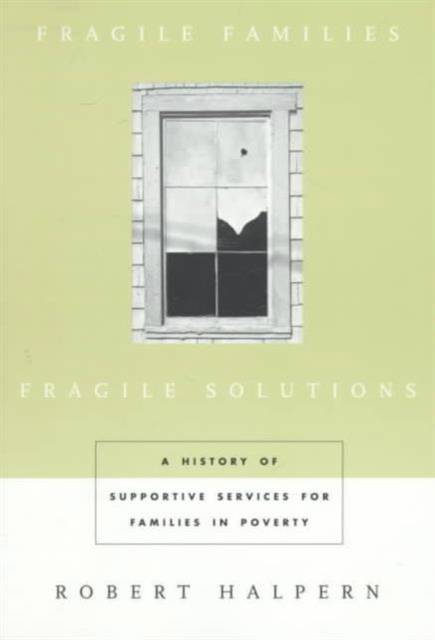
- Afhalen na 1 uur in een winkel met voorraad
- Gratis thuislevering in België vanaf € 30
- Ruim aanbod met 7 miljoen producten
- Afhalen na 1 uur in een winkel met voorraad
- Gratis thuislevering in België vanaf € 30
- Ruim aanbod met 7 miljoen producten
Fragile Families, Fragile Solutions
A History of Supportive Services for Families in Poverty
Robert HalpernOmschrijving
How has America's social welfare network benefited families living in poverty? In what ways has it failed to provide for their needs? The system of social welfare in the United States has been in place for most of this century-and although it has had lasting impact on the lives of many people in need, it is far from perfect in its handling of the nation's poor. Fragile Families, Fragile Solutions presents a historical perspective on one of the central components of the U.S. social welfare network-family services-and provides a unique look at the advances this service network has achieved, problems it has confronted, and where it is likely to go in the future.
Beginning with an exploration of the nineteenth-century roots of family services and the emergence of family casework at the beginning of this century, Halpern ranges through the 1920s and 1930- charting the influence of psychoanalytic theory in social service work and government responses to the Depression. He surveys the following two decades, when policymakers attempted to respond to changing inner-city populations. An extended section focuses on the 1960- a critical reform period. Covering a wide spectrum of contemporary issues in policy and organization, as well as escalating crises in such areas as child welfare, Halpern brings readers up to date on this complex subject. Offering policy recommendations for the future, Halpern inspires social workers and policymakers alike with a symbolic goal of constructing a more positive vision of the potential of social services, and a pragmatic objective of designing an efficient, effective family services network to care for Americans in greatest need of support.Specificaties
Betrokkenen
- Auteur(s):
- Uitgeverij:
Inhoud
- Aantal bladzijden:
- 312
- Taal:
- Engels
Eigenschappen
- Productcode (EAN):
- 9780231106672
- Verschijningsdatum:
- 25/09/1998
- Uitvoering:
- Paperback
- Formaat:
- Trade paperback (VS)
- Afmetingen:
- 152 mm x 229 mm
- Gewicht:
- 439 g

Alleen bij Standaard Boekhandel
Beoordelingen
We publiceren alleen reviews die voldoen aan de voorwaarden voor reviews. Bekijk onze voorwaarden voor reviews.











